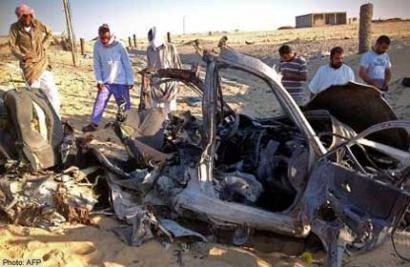Car bomb attack on Egypt police building kills 14

MANSOURA, Egypt - A car bomb tore through a police building in an Egyptian city early Tuesday, killing at least 14 people, an attack the authorities said was aimed at derailing the country's transition to democracy.
Hours after the bombing, prime minister Hazem Beblawi labelled the Muslim Brotherhood, the banned movement of ousted president Mohamed Morsi, a "terrorist" group, though the premier did not blame the organisation for the blast.
The attack, one of the deadliest since the military removed Morsi from power in July, comes just weeks ahead of a referendum on Egypt's new constitution that is billed as the first major step towards democracy after the Islamist leader's overthrow.
The bomb ripped through the police headquarters in the city of Mansoura, north of Cairo, security officials said. Medics said at least 14 people were killed and more than 100 wounded.
The security sources said the explosion was massive and a part of the building had caved in.
"The majority of the casualties are from the police," Omar al-Shawatsi, the governor of Daqahleya, of which Mansoura is the capital, told state media.
The impact of the explosion was felt around 20 kilometres (12 miles) away and shattered windows of nearby buildings, the security sources said.
The head of security for Daqahleya, Sami El-Mihi, was wounded in the blast and two of his aides were killed, security sources said.
An AFP correspondent at the scene said the building's facade had been ripped off by the impact.
The wreckage of an armoured police car stood nearby, while at least 10 civilian cars were damaged and a nearby building completely collapsed, he said.
Angry residents of the area vented fury at the Muslim Brotherhood.
"The Muslim Brotherhood is an international terrorist organisation. They are responsible for what happened in Mansoura," said Hamada Arafat, a school teacher told AFP.
"They are now adopting tactics like Al-Qaeda."
There has been widespread bloodshed in Egypt since Morsi's July 3 ouster.
He was removed from power after massive street protests against his turbulent one-year rule, with millions accusing him of power-grabbing and economic mismanagement.
Since then more than 1,000 people have been killed in a government crackdown on his supporters, including hundreds on August 14 in Cairo when police stormed two protest camps of his Islamist supporters.
The crackdown has also seen thousands of Islamists, including the entire leadership of the Brotherhood, arrested.
The movement's top leaders - including its supreme guide, Mohamed Badie - have been put on trial. Morsi too is on trial over several charges including some related to the deaths of protesters during his presidency.
Egyptian prosecutors and officials say the Muslim Brotherhood has links with Islamist militants who have stepped up attacks on security forces across the country but mainly in the restive Sinai Peninsula.
Brotherhood condemns bombing
Beblawi said Tuesday's bomb attack was an attempt to thwart the country's steps towards democracy and declared the Brotherhood a terrorist group.
"Prime minister Beblawi has declared the Muslim Brotherhood as a terrorist organisation," state news agency MENA quoted the premier's spokesman Sherif Showky as saying.
The declaration could have significant political impact ahead of the referendum, but will not have much legal impact as the group has already been banned by an Egyptian court.
In a separate statement released by MENA later, Beblawi said that "terrorism will not succeed in derailing the implementation of the road map", but did not mention the Brotherhood by name.
The 85-year-old Muslim Brotherhood, a political and social movement, prevailed in a series of polls following the overthrow of longtime dictator Hosni Mubarak in 2011, and Morsi became the country's first freely elected leader after winning elections last year.
On Tuesday the Brotherhood condemned the bombing "in the strongest possible terms", and also lashed out at Beblawi.
"It is no surprise that Beblawi, the military junta's puppet prime minister, has decided to exploit the blood of innocent Egyptians through inflammatory statements designed to create further violence, chaos and instability," the movement said in a statement.
After Morsi was ousted, Egypt's military-installed authorities announced a road map for a democratic transition.
On January 14 and 15 the country is holding a referendum on a new constitution - the first step in the plan.
The constitution, if approved, will be followed by parliamentary and presidential elections by mid-2014.